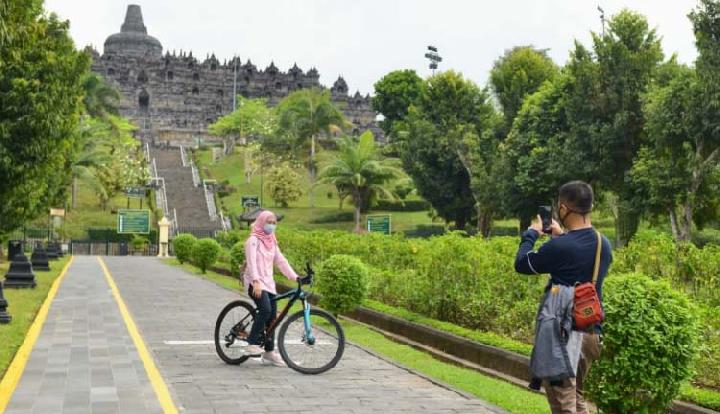Soil and Water - Asia-Pacific's Bread and Butter
Translator
Editor
5 December 2023 11:54 WIB

By: Jong-Jin Kim, Assistant Director-General and Regional Representative for Asia and the Pacific at the Food and Agriculture Organization of the United Nations (FAO)
Here, in the world’s most populous region, there is a crisis slowly unfolding that involves the earth beneath our feet. The soil that has been producing the food we eat and supporting the livelihoods of hundreds of millions of farmers and others, is under threat.
Often referred to as the "Skin of the Earth," soil acts as a silent steward, supporting the production of 95 percent of the food we eat in this region. It retains water, serves as a habitat for animals, and plays a key role in regulating our climate by storing more carbon than all the world's forests combined. But the ability of our soils to provide these ecosystem services are increasingly threatened due to decades of soil degradation and water scarcity, caused by overuse and misuse.
Soil and water rely on each other, and that’s critical to feed a hungry world. Here, in the Asia-Pacific region, some 90 percent of our freshwater is consumed in agricultural activities alone, considerably more than the 75 percent used by agriculture, on average, worldwide.
Yet, more than three-quarters of the Asia-Pacific population is now grappling with water insecurity. Much of this has been caused by mismanagement of our water and soil resources. Unsustainable practices have exacerbated the situation, contributing to the loss of biodiversity in terrestrial and aquatic ecosystems, and further challenging the resilience of agrifood systems facing extreme weather events. The fact that soils are not a renewable resource makes their preservation an even more urgent matter: it can take up to one thousand years to form one centimetre of soil, and this same centimetre can be destroyed in only a few minutes through careless acts of degradation.
In order to better understanding the close relationship between soil and water, is a critical necessity for countries to work domestically and cross-borders to ensure wider sustainable development in the Asia-Pacific region.
There are answers
While pressure on this soil-water-food nexus is increasing, reversing the degradation is still possible. But we all need to take responsibility. We all need to act. Together, we must promote soil and water management at all levels. We can all do our part by changing habits to preserve fresh water each day. Meantime, policy makers and other stakeholders can collaborate in implementing sustainable soil and water management practices. This involves planning and action to ensure more efficient use of fresh water, promoting sustainable use of fertilizers and pesticides, employing appropriate irrigation methods, including the ways we drain and pump water, and pay more attention to monitoring related data – such as soil and groundwater salinity levels. Indeed, all land users, particularly farmers and smallholders, need training in sustainable soil and water management and that means inclusive access to technology transfer.
Implementing sustainable soil management practices is both possible and crucial for transforming our agrifood systems, making them more resilient to extreme climate events. By doing so, our soils can become richer in carbon and can hold more water, benefiting the interconnected relationship between soil, water, and plants. This not only improves the overall health of the region's environment, but also enhances its ability to mitigate the effects of climate change. Research has found that Asian soils have the capacity to sequester 180 megatonnes of carbon per year, if sustainable high-carbon input soil management practices are adopted.
World Soil Day
Addressing soil degradation requires comprehensive domestic and international efforts involving government policies, research initiatives, and awareness programmes. Initiatives like the Glinka World Soil Award and the King Bhumibol World Soil Day Award, launched by the Government of Thailand, acknowledging the late king's dedication to sustainable soil management and its role in food security and poverty reduction, serve as exemplary models of localized endeavours. These efforts aim to recognize and encourage sustainable soil practices, fostering awareness and responsible management. Indeed, it is why we circle the 5th of December on our calendars each year to mark World Soil Day, to remind everyone of soil’s importance to us all.
Hosted by the Food and Agriculture Organization of the United Nations (FAO), the Global Soil Partnership, strives to enhance soil governance and promote the practice of sustainable soil management for food security, climate change adaptation and mitigation, and sustainable development.
In a world hungry for solutions, FAO is sowing the seeds of sustainability, emphasizing the importance of understanding, and addressing the complex nexus between soil health, sustainable agriculture, biodiversity conservation, and essential ecosystem services. In doing so, we aim to help countries achieve the Sustainable Development Goals (SDGs) and achieve better production, better nutrition, a better environment and a better life for all.
As we navigate the multiple challenges of recovery from the pandemic, conflicts, and the need for systemic agrifood systems reform, celebrating World Soil Day should extend beyond 5 December, calling for collective action and a daily commitment to safeguard the Earth's lifeline – our soil. It’s literally our bread and butter.
*) DISCLAIMER
Articles published in the “Your Views & Stories” section of en.tempo.co website are personal opinions written by third parties, and cannot be related or attributed to en.tempo.co’s official stance.






















